Maybe because he is spiritual. Or maybe because strange coincides have led him to believe in them. Either way, in mid-October, after spending over 11 days in the hills of Uttarakhand—where he had gone to celebrate Navaratri at an ashram—Lal returned to his hometown of New Delhi, refreshed, rejuvenated and feeling divine.
The next day, Uttarakhand was hit by heavy rainfall, leading to floods and landslides, and a death toll of nearly 60. Ranikhet, where Lal was stationed, is still cut off from the rest of the state. “It’s a close call, a divine intervention," Lal tells Forbes India. “I mean, everybody is seeing what has happened. For somebody who got out of there just 24 hours earlier, after spending 11 days, you can call it a coincidence. But you know."
Much of his wealth comes from his nearly 56 percent holding in the company, Dr Lal PathLabs, which has been at the forefront of pathological testing in India, particularly in a year ravaged by a pandemic. The company has a market capitalisation in excess of ₹29,000 crore, making it India’s most valuable player in the diagnostic services industry. It has over 200 clinical labs and more than 4,000 collection centres, offering some 5,000 pathology and radiology tests, including Covid-19 tests.
“Next year, take me off the list," Lal says jokingly about the Forbes India Rich List. “It’s not in my nature to flaunt or talk about my wealth. What I am trying to do now is focus on primary health care and do more towards society." Over the past few years, his business has played a pivotal role in the fight against Covid-19, with large-scale testing for the virus across the country. Dr Lal PathLabs processes some 2 crore samples annually and during the past few years, has tested over 3 million samples of Covid-19 in the country.
That is probably why, over the past year, the company has seen its market capitalisation surge by over ₹10,000 crore. It has also taken serious strides to foray into the southern markets, after becoming a dominant player in the northern and eastern parts of the country.
Shattered dreams
Much of Arvind Lal’s tryst with the pathology business was not entirely his own liking.
As a two-and-a-half-year-old, Lal was admitted to the prestigious Modern School on Barakhamba Road in New Delhi. “I was a premature baby, and was packed off to school at such a young age," Lal says. By the time he was in his fourth grade, he was clear that he wanted to become a fighter pilot in the Indian Navy.
![]() “People join the navy to roam around the seas, but I wanted to fly and be in the seas too," Lal says. He was awarded the best cadet in the National Cadet Corps in the Navy division and the path was clear to join the National Defence Academy in Khadakwasla in Pune. Back then, admissions into the defence programme began after class 10. “I had cleared the exam and was called in for my medicals when they found that I was mildly myopic," Lal says.
“People join the navy to roam around the seas, but I wanted to fly and be in the seas too," Lal says. He was awarded the best cadet in the National Cadet Corps in the Navy division and the path was clear to join the National Defence Academy in Khadakwasla in Pune. Back then, admissions into the defence programme began after class 10. “I had cleared the exam and was called in for my medicals when they found that I was mildly myopic," Lal says.
That meant, his ambitions to join the fighter pilot stream were shattered. While there were other options such as the supply corps and engineering division, Lal wanted to do nothing but fly. “A guy who wanted to join the navy since forever retired from the defence services at the age of 15," he says.
Eventually, upon his brother-in-law’s suggestion, Lal decided to give medicine a try. “I used to think that boys who study biology were not men... you know how crazy guys are at 13 or 15." Being rejected for NDA meant that Lal had to study biology, a subject he had not chosen for class 10. He had to study three years’ worth of material in eight months.
Lal cracked the exams and passed a pre-medical course at Dyal Singh College in Delhi before securing admission for MBBS at the illustrious Armed Forces Medical College (AFMC) in Pune.
By then, his father, Dr SK Lal, had set up Central Clinical Laboratory, known as Dr Lal’s Laboratory, in Delhi, after flocking to India ahead of the Partition from Rawalpindi in Pakistan.
SK Lal was a Major in the Indian Army and had retired from the service before independence. Soon after, he joined the government-run Provincial Health Laboratory in Delhi for nearly two years before setting up his own pathology laboratory.
![]() Lal being conferred the Padma Shri by Pratibha Patil, President of India, in 2009
Lal being conferred the Padma Shri by Pratibha Patil, President of India, in 2009
“Nobody had set up a private lab, and there were pathologists in government labs," Lal says. “The lab was set up in April 1949 and I was born in August 1949. So, the lab and I are almost like twins and that is how we get along with each other so well."
Even then, it was not his plan to join the family business until a family tragedy turned around their fortunes. SK Lal was allegedly killed by his brother, Anil, forcing Arvind Lal to take over his father’s business. “There were no witnesses to my father’s death," Lal wrote in his book, Corporate Yogi. “I have pieced the event together in my head, over and over again, like a slideshow. In the first panel, my parents are in their sitting room, having dinner while watching TV. Click. My mother gets up and walks towards the bathroom. Click. My father sits alone in the room, in his customary chair, with his back to the door. Click. The assassin looms up behind my father, the weapon belching fire. Click. My mother emerges from the bathroom to see my father slouched over and Anil standing there, with the smoking gun in his hand."
![]()
The giant leap
Lal joined his family business in 1977. “When I joined the lab, there were 25 or 30 patients coming there to get their blood tested," Lal says. Soon word-of-mouth helped in more clients, especially since Lal was equipped with a degree from AFMC, where he was teaching undergraduate medical students, pursuing a post-graduate in pathology, and serving as warden of the hostel. “Before I joined, thyroid tests were not available in private labs in India. I’m a pioneer of thyroid testing in private labs in India," he claims.
Because thyroid testing was categorised as nuclear medicine and the Bhabha Atomic Research Centre (BARC) in Mumbai was the nodal agency to help with the procedure and the kits, Lal and his wife met with scientists there and spent over three months learning the tricks before deciding to launch thyroid testing services from their labs in Delhi in 1982. The same year, the company’s lab was a standby laboratory for drug abuse testing for athletes in the ninth Asian Games.
That was followed by building a reputation for offering lipid profile tests, and liver function tests, among others. It also helped that the business was quick in adopting technology, including an auto-analyser that helped streamline and fasten processes, hormone-testing equipment and even computerising the labs.
![]() Lal, an honorary Brigadier in the Indian Army, was inducted in the Hall of Fame by the Armed Forces Medical College, Pune, in 2019
Lal, an honorary Brigadier in the Indian Army, was inducted in the Hall of Fame by the Armed Forces Medical College, Pune, in 2019
Soon, Lal discovered the world of franchising. “One of my regular patients, a resident of Model Town, North Delhi, used to come to my lab at least twice a day," Lal recalls. “He said ‘You are such a bright young man. Why can’t you set up a lab at Model town?’" With that, Lal set up what he calls the first franchise model in the health care business in India. The franchises were then tasked with collecting the samples which would then be sent to the company’s central labs for testing.
By 1995, the company renamed itself to Dr Lal PathLabs from Central Clinical Laboratory, and became a private limited company, with Lal, his wife and mother as directors. “When the operator used to pick up the phone, he used to say, Dr Lal’s Laboratory," Lal says. “So, I thought it’s better to change the name."
In 2001, the company opened its first lab outside Delhi in Gurugram the number has since grown to 234. In 2004, US-headquartered Quest Diagnostics, a spin-off of Corning Inc, decided to set up business in India, and Lal considered the prospect of partnering with their business as an equal partner with a plan to dilute his stake by 10 percent annually.
![]() Arvind Lal (seated, right) in the early 1950s, with his younger brother Anil, and parents Dr SK Lal and Vimla Lal
Arvind Lal (seated, right) in the early 1950s, with his younger brother Anil, and parents Dr SK Lal and Vimla Lal
That deal did not go through, and in 2005, Dr Lal PathLabs brought in its first round of private equity investments when WestBridge Capital bought a 26 percent stake in the company, valuing the business at $24 million (₹106 crore). The deal was one of the first in diagnostic chains in the country, with a follow-on investment again in 2007. By 2010, private equity firm TA Associates bought a nearly 16 percent stake for $35 million (₹221 crore) from Sequoia Capital India, which had acquired WestBridge Capital in 2006.
That was soon followed by an investment of $44 million by WestBridge Crossover Fund in 2013, valuing the company at around ₹1,750 crore. In 2005, the company also brought in Om Manchanda, a veterinary doctor-turned-management executive as full-time CEO.
The bull run
In 2015, Dr Lal PathLabs went public. It raised ₹638 crore and since then, the company has seen its revenue grow by over 70 percent while profits have doubled. The company currently focuses on two areas: A diagnostic chain for walk-in patients and a business-to-business model that caters to hospitals. “Today, we are doing between 70,000 and 80,000 tests a day," says Lal.
![]() The company now as plans to expand into the southern and western markets. “We are strong in the North, Central and East India," Lal says. “We are now introducing newer tests and are the largest in histopathology biopsy, and also have the second-largest kidney biopsy testing lab."
The company now as plans to expand into the southern and western markets. “We are strong in the North, Central and East India," Lal says. “We are now introducing newer tests and are the largest in histopathology biopsy, and also have the second-largest kidney biopsy testing lab."
India’s domestic diagnostic industry is estimated at $9 billion (around ₹67,500 crore) and is expected to have a compound annual growth rate (CAGR) of 10 percent over the next five years, according to Edelweiss, a research firm. “Growth will be primarily driven by a change in demographics, increase in lifestyle diseases, and higher income levels across all strata of society, rise in preventive testing, deeper penetration with asset-light expansion, and spread of health care services and insurance," says a 2020 report from Edelweiss.
Of this, diagnostic chains command some 16 percent market share. “The four major players—Dr Lal PathLabs, Metropolis Healthcare, SRL Diagnostics and Thyrocare Technologies—have a share of 6 percent," Edelweiss says in the report. “So, there is a huge opportunity for national players to consolidate and for organic expansion."
“They have very good margins and their return on equity has been phenomenal," says Vishal Manchanda, research analyst for pharma at Nirmal Bang Institutional Equities Research. “Every fund is invested in the stock, and those who aren’t have regretted not being there. Dr Lal PathLabs has the early mover advantage in the organised market, which is poised for large growth as testing become crucial, whether voluntarily or otherwise."
“Over the years, they have built up a reliable diagnostic and high-value brand," says Surajit Pal, AVP and pharma analyst at Prabhudas Lilladher. “But the industry is now slowly and gradually emerging and there will not be brick-and-mortar facilities alone. Over the next five years, health care will emerge as a one-stop solution and that’s where the company will need to reinvent itself. They have a 70-year-old legacy to leverage on, and perhaps do something similar to what Thyrocare has done."
![]() Dr Lal PathLabs has over 200 clinical labs and 4,000 collection centres, offering some 5,000 pathology and radiology tests, including Covid-19 tests
Dr Lal PathLabs has over 200 clinical labs and 4,000 collection centres, offering some 5,000 pathology and radiology tests, including Covid-19 tests
In June, A Velumani, founder of Thyrocare, surprised everyone when he sold his company to PharmEasy, a relative newcomer in the health industry and a unicorn. It was one of the first instances of a startup buying a listed company. Velumani sold his 66 percent stake for ₹4,546 crore to PharmEasy’s parent company, API Holdings. He will use ₹1,500 crore of those proceeds to buy 4.9 percent in API, which will propel PharmEasy’s valuation from ₹13,390 crore ($1.8 billion) to over ₹29,700 crore (roughly $4 billion).
India currently has more than 5,000 health tech startups and the health tech market, according to IAMAI-Praxis Global Alliance, is expected to reach $5 billion by 2023 at a CAGR of 39 percent.
![]() A view of Lal’s flagship lab in Rohini, Delhi, which is Asia’s biggest and is spread across an area of 85,000 sq ft
A view of Lal’s flagship lab in Rohini, Delhi, which is Asia’s biggest and is spread across an area of 85,000 sq ft
“Due to physical restrictions and safety concerns due to the pandemic, there has been an increased adoption towards tele-consultation, homecare services, e-pharmacy, online fitness and digital personal health management which has catapulted the Indian health tech sector on a high growth path," consultancy firm RBSA Advisors said in a recent report. “The consumer adoption that health tech has been able to achieve in 2020 would have taken at least 4-5 years in a non-Covid-19 scenario."
For now, Lal and his business are not likely to face any bumps. Personally, he is spending much time focusing on his philanthropy foundation that is helping set up primary health care facilities, and setting up Hyperbaric oxygen therapy facilities, a type of treatment used to speed up healing of carbon monoxide poisoning, gangrene, stubborn wounds and infections in which tissues are starved for oxygen in high-altitude warfronts such as Siachen.
“I have been a military man all my life," says Lal, who was made an honorary Brigadier in the Indian Army. “It is now time to give back to the society."

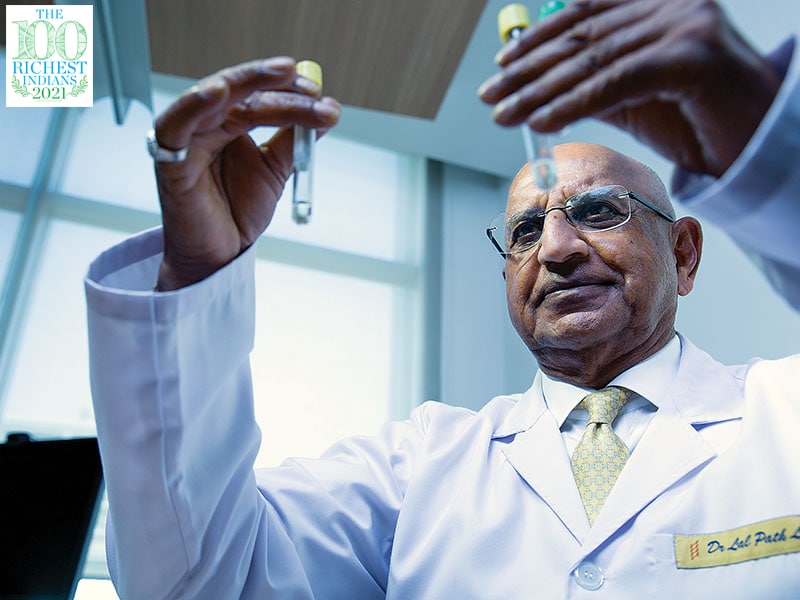 Dr. Arvind Lal of Dr Lal’s Laboratory
Dr. Arvind Lal of Dr Lal’s Laboratory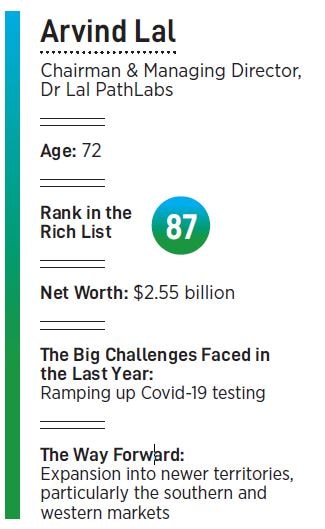 “People join the navy to roam around the seas, but I wanted to fly and be in the seas too," Lal says. He was awarded the best cadet in the National Cadet Corps in the Navy division and the path was clear to join the National Defence Academy in Khadakwasla in Pune. Back then, admissions into the defence programme began after class 10. “I had cleared the exam and was called in for my medicals when they found that I was mildly myopic," Lal says.
“People join the navy to roam around the seas, but I wanted to fly and be in the seas too," Lal says. He was awarded the best cadet in the National Cadet Corps in the Navy division and the path was clear to join the National Defence Academy in Khadakwasla in Pune. Back then, admissions into the defence programme began after class 10. “I had cleared the exam and was called in for my medicals when they found that I was mildly myopic," Lal says.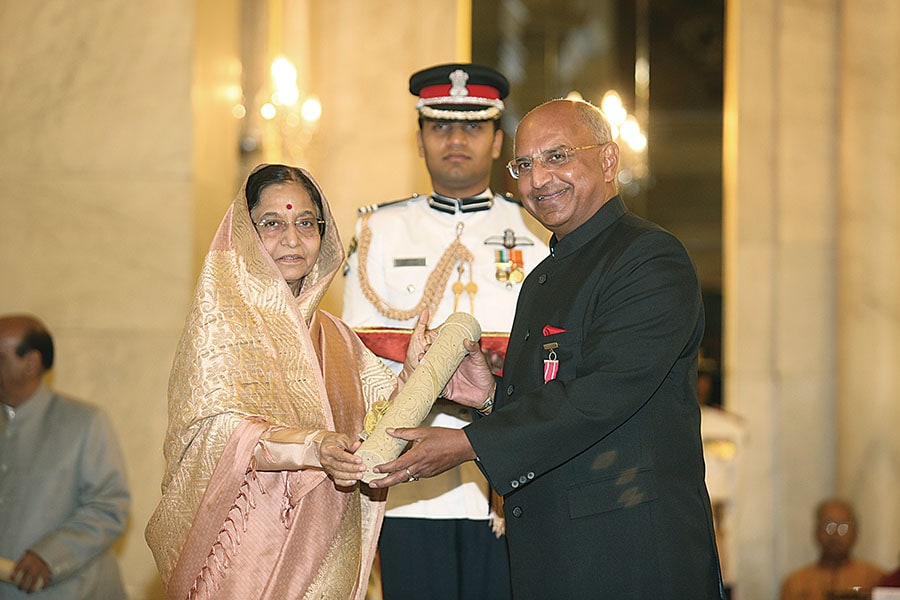 Lal being conferred the Padma Shri by Pratibha Patil, President of India, in 2009
Lal being conferred the Padma Shri by Pratibha Patil, President of India, in 2009
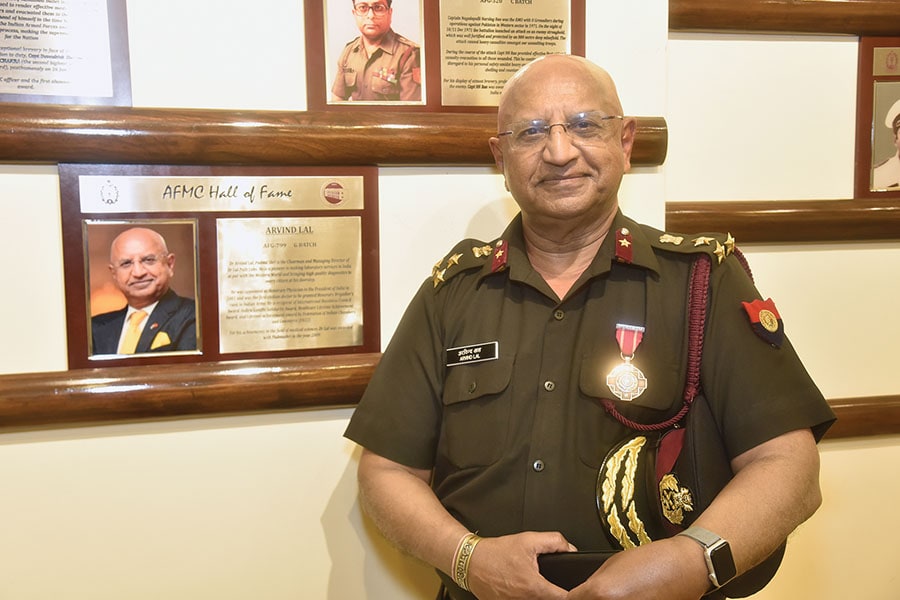 Lal, an honorary Brigadier in the Indian Army, was inducted in the Hall of Fame by the Armed Forces Medical College, Pune, in 2019
Lal, an honorary Brigadier in the Indian Army, was inducted in the Hall of Fame by the Armed Forces Medical College, Pune, in 2019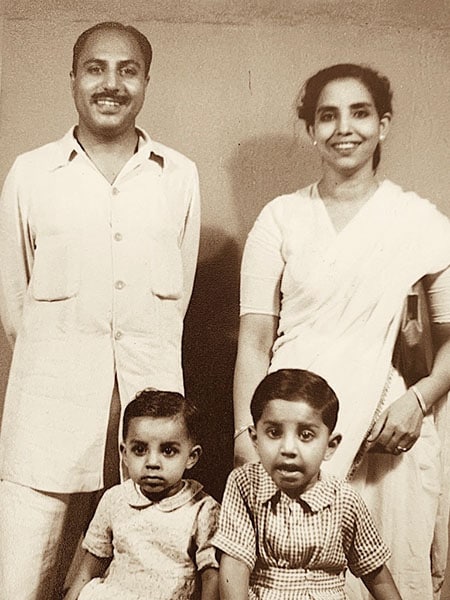 Arvind Lal (seated, right) in the early 1950s, with his younger brother Anil, and parents Dr SK Lal and Vimla Lal
Arvind Lal (seated, right) in the early 1950s, with his younger brother Anil, and parents Dr SK Lal and Vimla Lal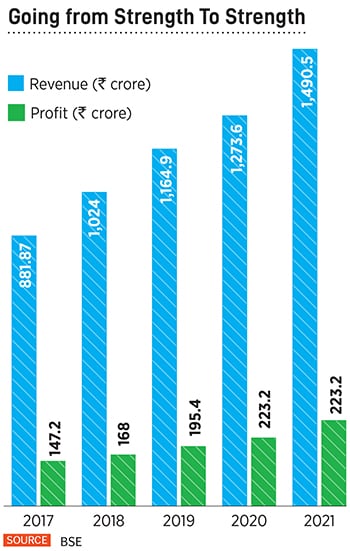 The company now as plans to expand into the southern and western markets. “We are strong in the North, Central and East India," Lal says. “We are now introducing newer tests and are the largest in histopathology biopsy, and also have the second-largest kidney biopsy testing lab."
The company now as plans to expand into the southern and western markets. “We are strong in the North, Central and East India," Lal says. “We are now introducing newer tests and are the largest in histopathology biopsy, and also have the second-largest kidney biopsy testing lab."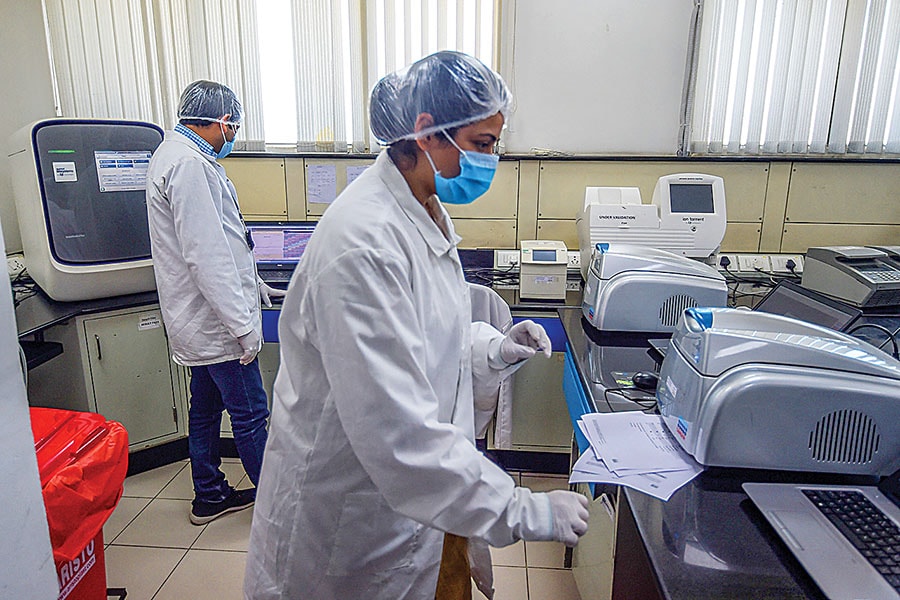 Dr Lal PathLabs has over 200 clinical labs and 4,000 collection centres, offering some 5,000 pathology and radiology tests, including Covid-19 tests
Dr Lal PathLabs has over 200 clinical labs and 4,000 collection centres, offering some 5,000 pathology and radiology tests, including Covid-19 tests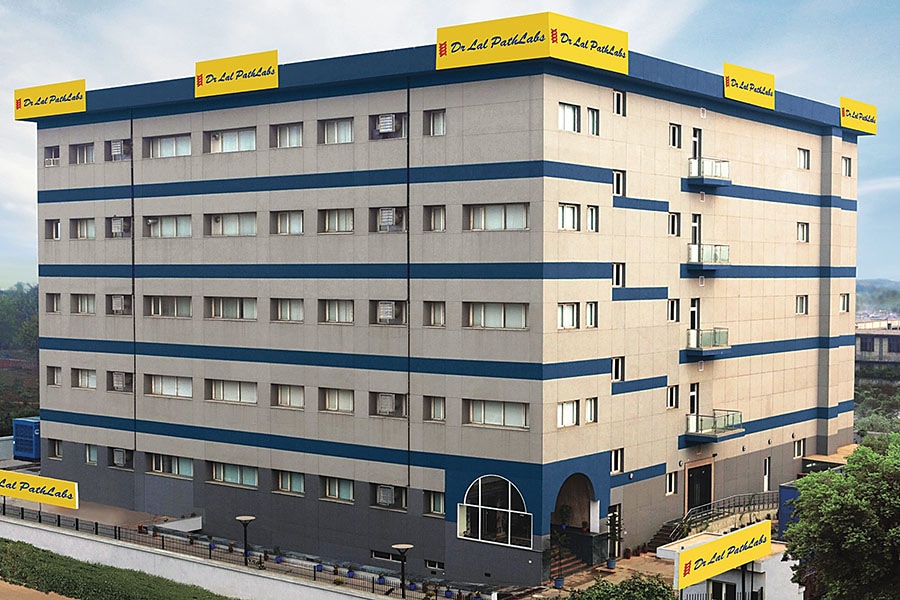 A view of Lal’s flagship lab in Rohini, Delhi, which is Asia’s biggest and is spread across an area of 85,000 sq ft
A view of Lal’s flagship lab in Rohini, Delhi, which is Asia’s biggest and is spread across an area of 85,000 sq ft